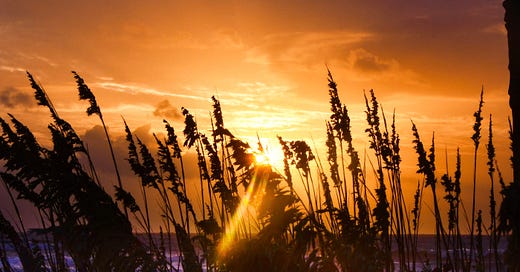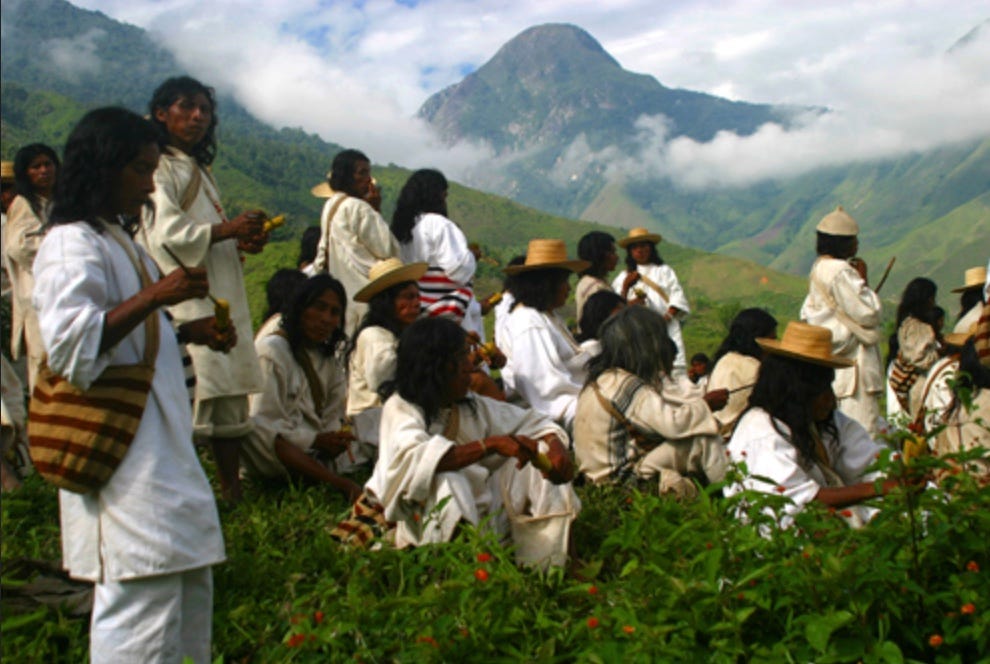The real magic isn’t in what you can explain—it’s in what you feel without knowing why.
A couple of posts ago, I wrote about the notion of the blandscape—that strange flattening of the world around us, when the living landscape fades into a kind of grey backdrop. The hills are still there, the trees, the sky—but we stop seeing them. They lose their depth, their presence, their conversation with us. It’s not just a perceptual issue; it’s a spiritual one.
Because the richness of the world around us—its biodiversity, its wildness, is not separate from our inner worlds. They are one and the same. Two mirrors facing each other. What happens to one, happens to the other. A culture that forgets this, that sees nature as scenery and the soul as a self-help project, is very unwell indeed.
This is what I’ve come to see: the destruction of nature around us is also a withering of our humanity. It erodes something essential in us, our soul, our capacity for mystery, for relationship, for reverence. We are not just creatures that breath, and eat and roam around. We are far beyond that.
The Kogi people of the Sierra Madre mountains in Colombia understand this in their bones. They’re one of the few, if not the only, Indigenous tribes in South America who escaped the destruction of colonisation. Because of that, they’ve held onto a message that cuts through the noise of modern life. They refer to us as the "Younger Brothers", not in an insulting way, but in a way that points to our immaturity, our forgetfulness. They believe we’ve lost our connection to the Earth and to the spiritual intelligence that underpins life.
Their message was powerfully shared in the documentary From the Heart of the World: The Elder Brothers’ Warning, directed by Alan Ereira. It’s decades old now, but still rings like a bell through time. I’m pretty sure you can find it on YouTube. Watch it. They saw what was coming—not in a predictive sense, but in the way you see a plant wilt when it’s not watered. They understood the soul-hunger before we had the words for it.
I feel that hunger right now. I know it well. It’s not depression or burnout—it’s a very specific kind of dryness that comes when the deep well inside hasn’t been visited in a while. I’ve been working long days, and I’m okay with that. I’m saving money, getting things done, building the foundation for the months ahead when I’ll be abroad writing, deep in my creative cave. But I’ve tipped too far into the yang. Too much doing, not enough being. And the soul doesn’t respond well to being sidelined.
I feel for those who haven’t yet learned to recognise this kind of hunger. Our culture gives us no language for it. It just says: keep going. Distract yourself. Scroll more. That is the culture we live in. One that does not recognise the soul aspect of our being. We cannot fathom what we lost lost when we took the hearth from the home and replaced it with central heating.
It takes constant effort to nurture our souls in the world today. In olden times it was not so. In ancient Ireland, poets held a revered place at the very heart of society. I was flicking through a book called The Druids by Peter Berresford Ellis recently. He recounts that the poets, or filí, would carry a craebh ciúil, a branch adorned with tiny bells, whose gentle sound would accompany their presence, marking them as emissaries between worlds. This ceremonial symbol reflected the deep recognition that their role was sacred: to speak what lay beyond the surface. In honoring them, our ancestors acknowledged that without the language of dream, myth, and vision, a culture begins to dry out at its roots. And so it is today. Art, true art that gestures toward the invisible, is not a luxury. It is a lifeline. If we lose the means by which we journey inward, by which we engage with mystery and meaning, then we lose the soul-language that makes us fully human.
So we must learn how to come back to that deeper layer. That dream layer.
Lately I’ve returned to Haruki Murakami—his novels always seem to come to me when I’m stretched too thin. His worlds soothe this part of me. Time slips. Emotions hang like mist. Rooms shift. People vanish. And yet it all feels true. Emotionally grounded. Like how life actually feels when you’re honest about it.
His writing reminds me of James Hillman’s work on dreams and the psyche. Hillman didn’t see dreams as things to be solved, but as places. As landscapes of the soul. He often said the psyche isn’t logical, it’s imaginal, layered, strange, poetic, full of contradictory gods and meanings. Reading Murakami is like reading a dream. And it brings me back to the Irish psyche too, our deep knowing that not everything needs to be explained. That myth and memory are part of the same terrain.
To be fully human, we need to walk in awareness of these layers. We need to re-enchant the world.
There’s a question I’ve often pondered, and I’m sure you have too: If you could have dinner with three people from history, who would they be? First up for me, without question, is Carl Jung. I would love to sit with him today and hear how he maps the collective unconscious of our time. I wonder what he would say about the wars, the polarisation, the ecological collapse, the numbing flood of media. What myths are we living right now? What archetypes have been unleashed? And while I’m at it I’d ask him to interpret my dreams. Because I am a child in this, I’m floating in a sea of mystery.
We are all feeling it now. The news has become noise, information has turned to overwhelm, something in us starts to shut down. And that’s the moment we need to pause, breathe, and drop a layer deeper. The mythic layer. The imaginal layer. The layer that doesn’t need to make sense, but that still speaks the truth.
These days I find myself veering between despair and deep conviction that something is unfolding exactly as it must. That we are in a great forgetting—but also a slow remembering. The question is not just how to fix the world, but how to see it again. To feel it. To feel ourselves again.
We all have the right to live in relationship with a rich, bountiful world—both outside and inside. But everything is being flattened. The land is being levelled. The undulating beauty of life, its deep inner weather, is being turned into a beige uniformity, both literal and metaphoric.
And that, more than anything, is what worries me.






How right you are about “too much doing and not enough being”.
I have a pet hate and it’s Cobblelock.It seems that every second front garden has it ,not a blade of grass in sight.